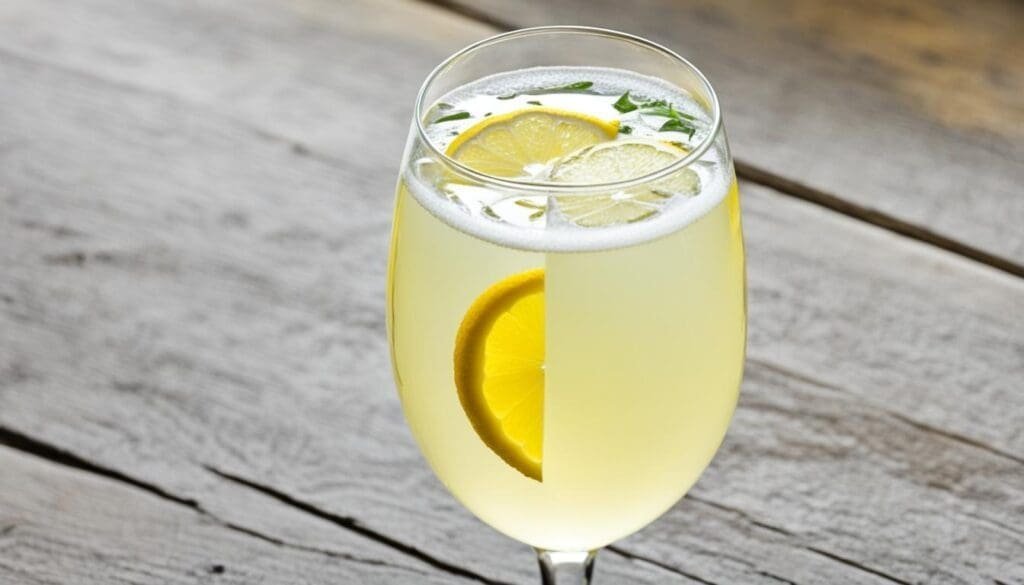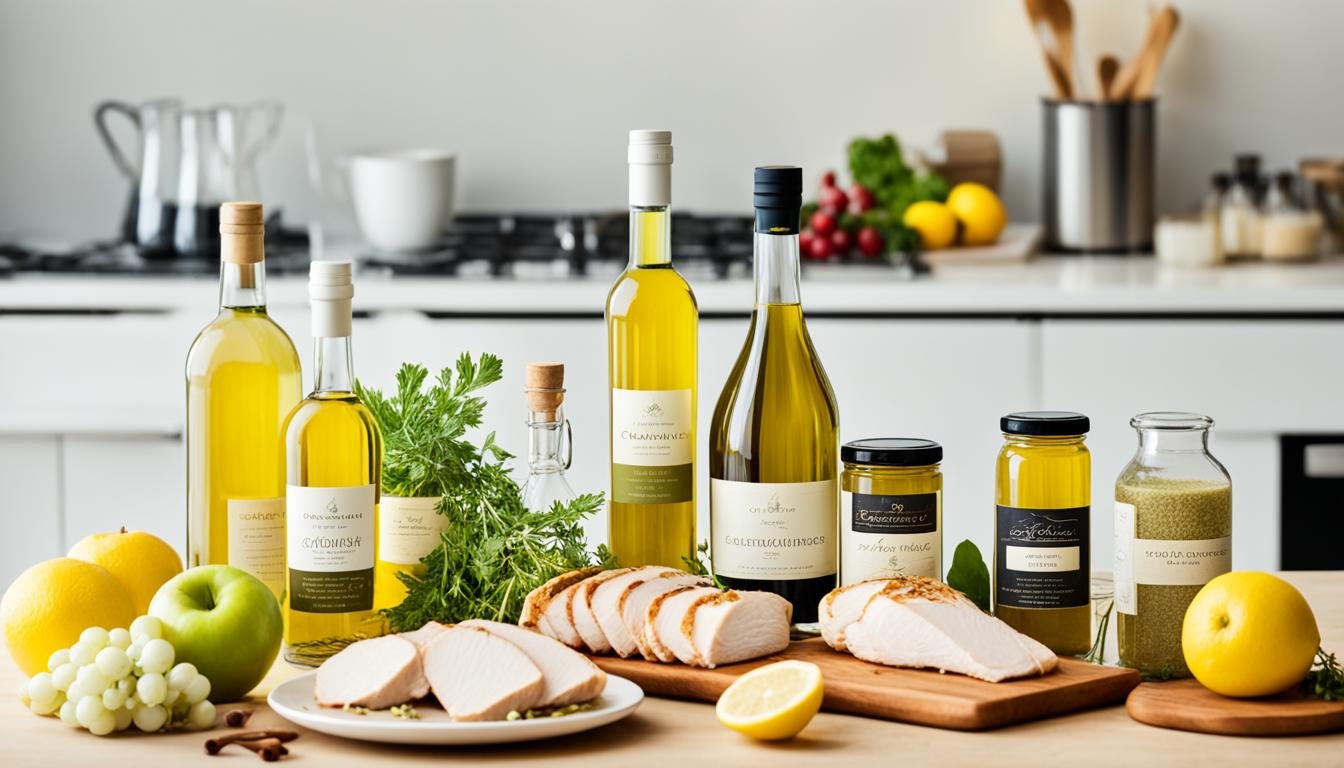Did you know almost 70% of Australians enjoy cooking with wine? But often, we find ourselves without our go-to dry white wine. Whether it’s for a tasty sauce or a simple risotto, having the right substitutes can save the day. Don’t worry, there are many effective substitutes for dry white wine that can enhance your dishes.
From the zesty kick of lemon juice to the herbal notes of vermouth, this guide will explore the best options for you. Discover how simple alternatives can change your cooking. With everything from vinegar to broths, you’ll learn to elevate your dishes easily. This article will show you how to use substitutes like a pro!
The Role of Dry White Wine in Cooking
Dry white wine does more than just add class to your meals. It brings acidity, balancing flavours and making dishes more enjoyable. By deglazing pans, it turns leftover bits into a tasty treat.
Why Use White Wine?
Wine adds depth and complexity to recipes. For example, a cup of dry white wine can make creamy sauces and risottos burst with flavour. Chardonnay, Pinot Grigio, and Sauvignon Blanc are great for cooking because they’re crisp and refreshing.
Cooking white wine for 2.5 hours can cut the alcohol content significantly. So, you can serve dishes that are safe for everyone.
Typical Dishes That Use White Wine
Think of dishes like shrimp scampi or beurre blanc sauce. These recipes use dry white wine to enhance the flavours of their ingredients. A few tablespoons can deglaze pans after sautéing veggies, while a full cup adds depth to gravies and cream sauces.
With a bottle of cooking wine costing about $8 to $12, you can improve your meals without spending a lot.
Substitute for Dry White Wine: Best Options for Cooking
Don’t worry if you’re out of dry white wine for cooking. There are great alternatives you can use. Each one adds something special to your dishes, like acidity or sweetness.
Vinegar as a Substitute
Vinegar is a top choice if you need a dry white wine substitute. Use white wine vinegar or apple cider vinegar for that acidity. Mix 1/2 cup of vinegar with 1/2 cup of water for every cup of wine. This mix keeps the dish tasty but not too sour.
Broths and Stocks
Broths like chicken or vegetable can also work well instead of white wine. Just swap 1 cup of broth for every cup of wine. Adding a bit of lemon juice can make it taste even better, just like wine.
Citrus Juices
Lemon juice is another great option when you’re out of dry white wine. Mix 1/4 cup of lemon juice with 3/4 cup of water for each cup of wine. This mix adds the right amount of acidity. But remember, too much lemon can overpower the other tastes.

Non-Alcoholic Alternatives to Dry White Wine
If you want to make a tasty dish without alcohol, try some great non-alcoholic substitutes for dry white wine. These options can make your meals better and fit your needs. Let’s check out some delicious choices.
Non-Alcoholic Wine
Non-alcoholic wine is a top pick for those who love the taste of white wine but want to avoid alcohol. Brands like Leitz Eins Zwei Zero Riesling and Giesen Sauvignon Blanc offer rich flavours similar to traditional wines but without the booze. They’re perfect for deglazing pans or adding depth to sauces.
White Grape Juice and Apple Juice
White grape juice is a sweet non-alcoholic substitute for dry white wine. It’s great for adding sweetness or deglazing a pan. Mixing it with vinegar or lemon juice balances the sweetness and adds acidity. Apple juice is sweeter but can also work as a substitute, especially when diluted. Finding the right mix is important to keep the dish’s flavour and stay alcohol-free.

How to Measure Substitutes in Cooking
Getting the right amount of wine substitutes is key. Knowing how to use substitution ratios in cooking can make a big difference. For most recipes, swap 1 cup of dry white wine with 1 cup of non-alcoholic wine, chicken broth, or apple juice. If you prefer vinegar, mix it with water at a 1:1 ratio to balance its sharp taste.
Understanding Ratios for Substitution
Using the right ratios can make cooking better. For example, use 2 tablespoons of white wine vinegar for every ½ cup of wine. For a sweeter taste, try white grape juice or a bit of lemon juice. These can add the right acidity and sweetness to your dish. Feel free to adjust the ratios based on what you like best.
Testing Flavours as You Go
Tasting your food as you cook is very helpful. It helps you know if you need more substitutes. If you’ve added broth or juice, taste it to check if it meets your taste goals. Making small changes can make your dish just right. A little lemon juice can add the perfect touch of zest.

Tips and Tricks for Successful Substitutions
Learning how to swap dry white wine in cooking opens up new culinary doors. It’s key to think about the dish you’re making when choosing a substitute. For example, chicken broth or vegetable stock are great for savoury dishes. On the other hand, apple juice or ginger ale are perfect for desserts.
Remember, balancing flavours is crucial. If your substitute lacks white wine’s acidity, a bit of vinegar or lemon juice can help. This ensures your dish tastes just right. Also, try using pomegranate or cranberry juice for a unique twist. These alternatives not only match the acidity but also add their own special taste.
Keeping track of your experiments can lead to great discoveries. Writing down what works best helps you improve and explore new cooking paths. You might find new favourite flavour combinations. Use these tips to make tasty meals without dry white wine.
Frequently Asked Questions
What can replace dry white wine in a recipe?
You can use vinegar (diluted with water), chicken or vegetable broth, or citrus juices like lemon juice to replace dry white wine in your recipes.
What is a good substitute for dry white wine when cooking?
Good substitutes include white wine vinegar (diluted), non-alcoholic wine, or white grape juice mixed with vinegar to cut sweetness.
Can I use non-alcoholic wine in place of dry white wine?
Absolutely! Non-alcoholic wine is a fantastic alternative that provides similar complexity without the oh-so-fun hangover.
How do I use vinegar as a substitute for dry white wine?
Mix vinegar with water in a 1:1 ratio. This helps mimic the acidity of white wine without overwhelming the dish.
What should I consider when choosing a substitute for dry white wine?
Think about the dish type. For rich, savoury dishes, hearty broths work best, while lighter dishes can benefit from citrus juices.
Is white grape juice a suitable alternative to dry white wine?
Yes, but be cautious since it’s sweeter. Mixing it with vinegar or water can help achieve a better balance for your dish.
Can I substitute dry white wine with water?
While it’s possible, water lacks the flavour complexity and acidity that dry white wine offers. It’s better to opt for broth or juice instead.
How much of a substitute should I use for dry white wine?
Generally, use a 1:1 ratio for broths and juices. For vinegar, mix it with water in equal parts to balance the acidity.
What’s the best way to ensure the substitute maintains the dish’s flavour?
Continuously taste your dish as you cook, making adjustments in small increments to hit the right flavour notes!
Are there any tips for successful substitutions?
Keep a balance of flavours, experiment freely, and take notes on what works for you—your culinary journey deserves the best!
Source Links
- The Best White Wine Substitutes for Cooking, According to Pros – https://www.wineenthusiast.com/culture/wine/white-wine-substitutes/
- 5 White Wine Substitutes to Cook With When You Don’t Have a Bottle on Hand | Livestrong.com – https://www.livestrong.com/article/534079-a-cooking-alternative-for-dry-white-wine/
- Out Of White Wine? Don’t Panic—Here’s What You Can Sub In – https://www.delish.com/cooking/g39529928/best-white-wine-substitutes/
- Selecting a Dry White Wine for Cooking | Wine Folly – https://winefolly.com/wine-pairing/dry-white-wine-for-cooking/
- How to Choose a Dry White Wine for Cooking – https://www.marthastewart.com/8129119/best-dry-white-wines-cooking
- The Best White Wine Substitutes—and How Much to Use of Each When You Cook – https://www.marthastewart.com/8138880/best-substitutes-white-wine-in-cooking
- No White Wine? Good Nonalcoholic Substitutes When Cooking – https://www.thespruceeats.com/white-wine-substitute-1388898
- The Best Non-Alcoholic Substitutes for Red & White Wine – https://www.thekitchn.com/simple-nonalcoholic-substitutes-for-red-and-white-wine-tips-from-the-kitchn-184394
- Must-try Non-Alcoholic White Wine Alternatives – https://www.betterrhodes.com/blogs/all-together/must-try-non-alcoholic-white-wine-alternatives
- 11 Non-Alcoholic Substitutes for Wine (Both Red and White) – https://www.healthline.com/nutrition/wine-substitutes
- Best White Wine Substitutes for Cooking + Tips for Choosing – https://www.drinksurely.com/a/blog/white-wine-substitute-cooking
- The Best Substitutes for Red Wine and White Wine in Cooking – https://www.bhg.com/recipes/how-to/cooking-basics/wine-substitute/
- The Best Substitutes for Red and White Wine in Cooking – https://www.acetovarvello.com/en/best-substitutes-for-red-and-white-wine-in-cooking/
User Review
( votes)Sip smarter, subscribe now!
Subscribe for gourmet tips, event updates, travel ideas, and a free e-book on Food Pairings. Start your journey to culinary and travel excellence!













